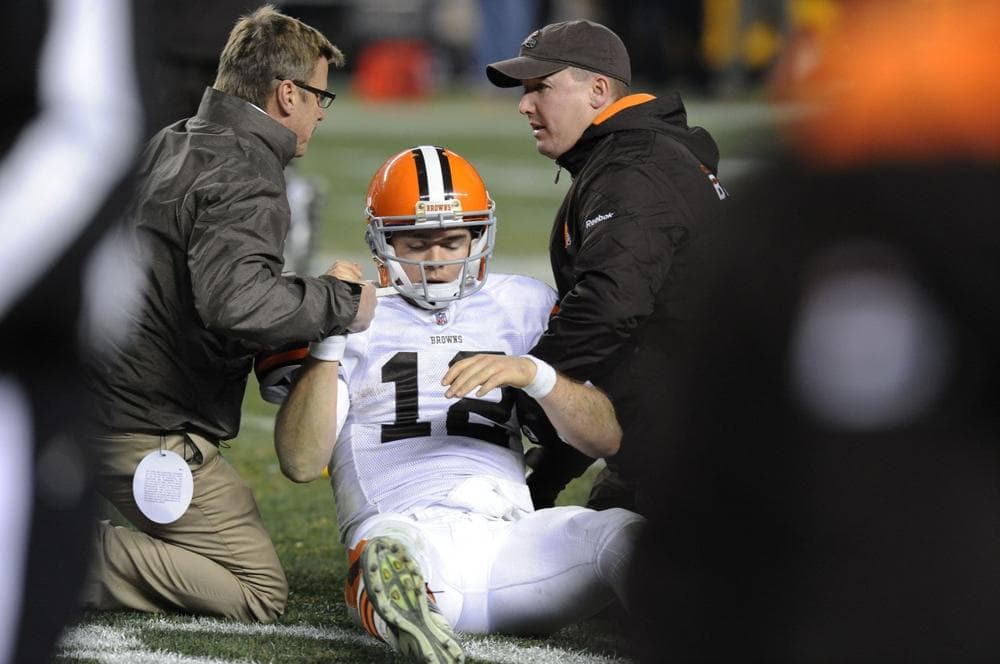Advertisement
Interview
Dr. Bill Meehan And The Science Of Helmets

After visiting with a handful of companies offering new technologies aimed at reducing concussions, Karen Given met with Dr. Bill Meehan to better understand the science behind the injury. Dr. Meehan is the director of Boston Children's Sports Concussion Clinic and the Micheli Center for Sports Injury Prevention.
KG: Well, let’s start here. What causes a concussion, and why is it so hard to build a helmet that can prevent it?
BM: That’s a great question. So concussion is caused by rapid spinning of the brain, what we call rotational acceleration of the brain, and that deforms some of the cells of the brain and causes them to malfunction. Helmets were introduced to reduce catastrophic brain injury — basically fractures of the skull, blood in the brain, swelling of the brain.
[sidebar title="New Technologies" width="630" align="right"] Companies are racing to produce a helmet that will reduce concussions. Karen Given examines the new technology. [/sidebar]They’re very effective at that, but the helmet doesn’t reduce spinning of the brain. If somebody’s wearing a football helmet, you strike them on a chin or you strike them on the front of their face, their head’s going to spin, and, in fact, the facemasks of these stick out another inch or so from the face and acts like a fulcrum and probably even spins the head a little bit faster if they got caught in the facemask.
KG: So has anything come onto the market yet that’s been proven to make a difference?
BM: Not definitively, or at least not published in the literature. I hope they all work, to be honest, but you can’t just say that it works, and you can’t just discuss the science or philosophy of why you think it’s going to work. You have to show it. You have to give some athletes this new technology while some athletes use the old technology and see: do they in fact sustain less concussions. And nobody’s done that. And in the studies that have been conducted they haven’t shown any decrease in the incidence of concussion.
KG: So with all of these different options and all of these different theories and all of these scientific stories, when parents come to you and say, “What helmet should I put my kids in?” What can you tell them?
BM: I wouldn’t recommend a specific type or a specific brand. I would say it should be undamaged, it should be relatively new, it should fit properly, the kids should wear it — adults, too – with the chinstrap the way it’s supposed to be worn. Those things are going to be way more important. They’re going to reduce your risk of catastrophic brain injury which is what they were intended for.
KG: I’ve gotta think that to do this job and to see kids and hear about kids with concussions every day, you have to have some hope in something that will change the situation. What do you put your hope in?
BM: I would take it even further. Somebody once said to me, this was at the start of a conference, “Can we all accept that injury is a part of football and an inevitable part of football.” I don’t think that’s true. I don’t think that’s true about football. I don’t think that’s true about ice hockey.
I think that we can prevent those injuries. And the fact that we don’t yet know how to do it doesn’t mean that it’s not possible. So I think ultimately with conditioning, with rule changes, potentially with equipment — both on-field equipment and personal equipment – my goal would be to prevent all injuries or at least the vast majority of them.
KG: But then you’d put yourself out of business?
BM: Well, yeah, that’d be a happy day. I’d be happy to be out of business if we made sports 100 percent safe. I don’t think it will happen in my lifetime, but if I can get us part of the way there I’d be delighted.
This segment aired on August 24, 2013.
